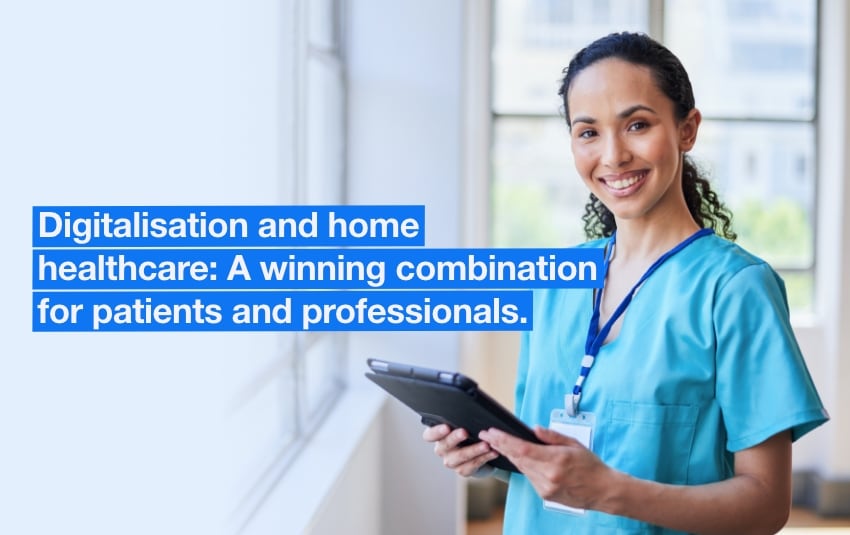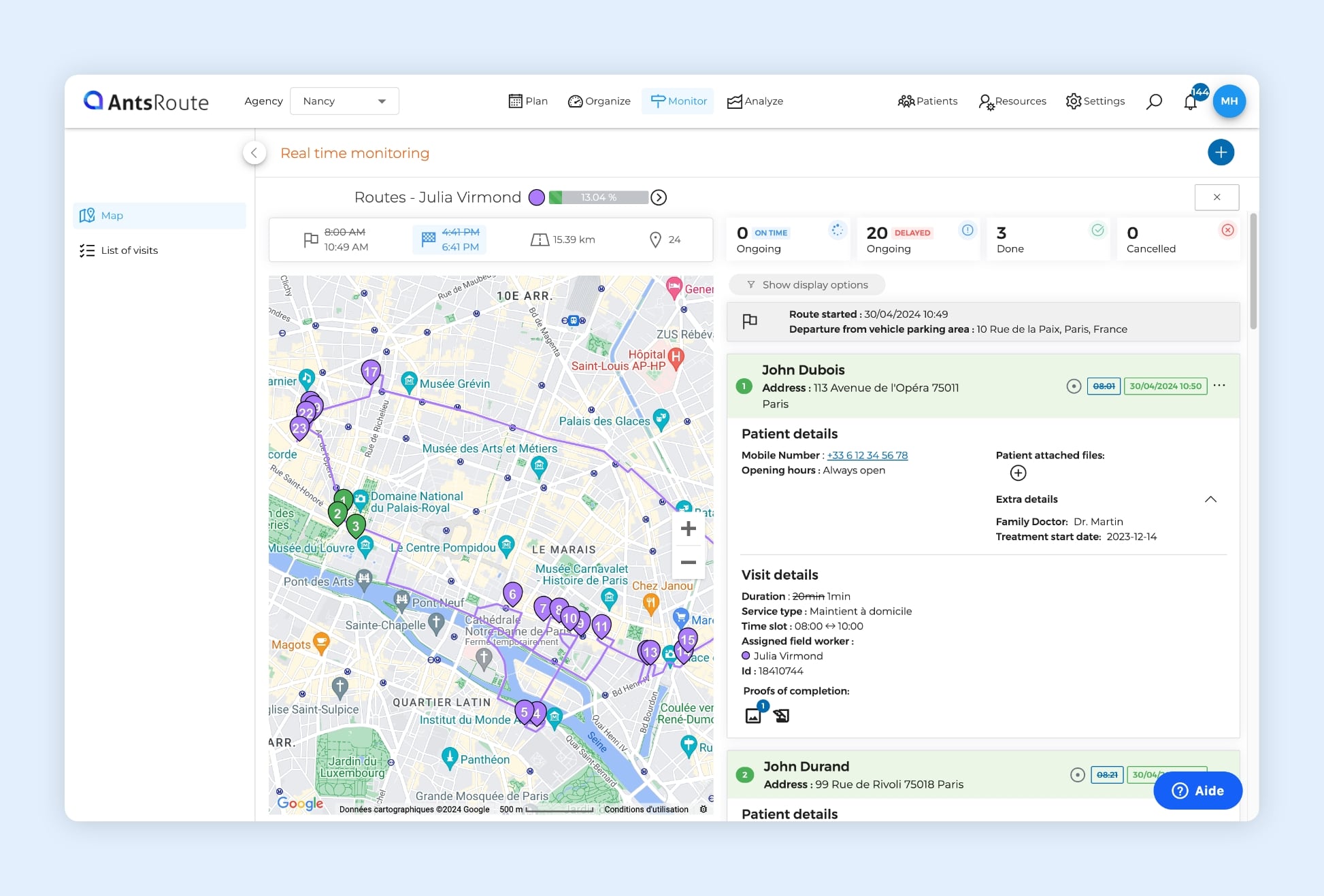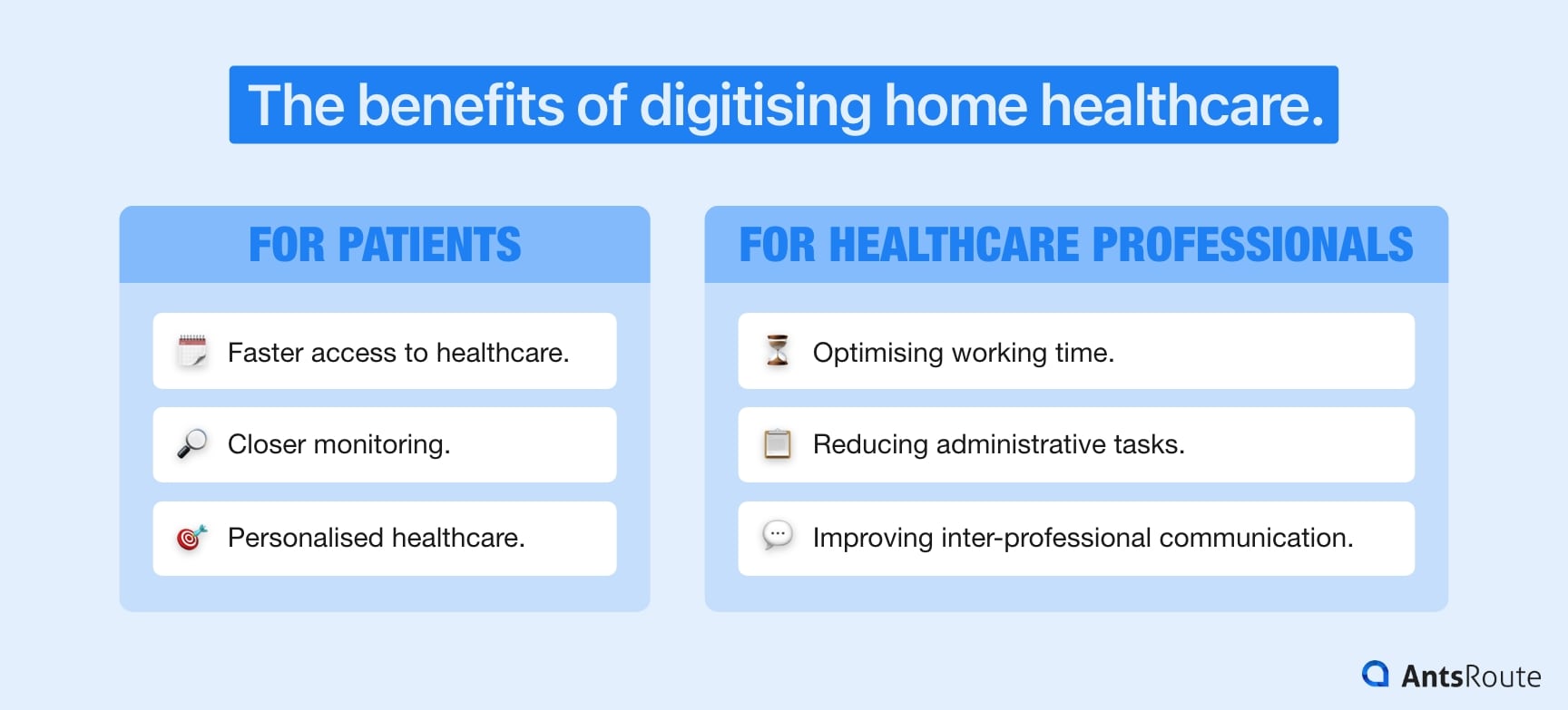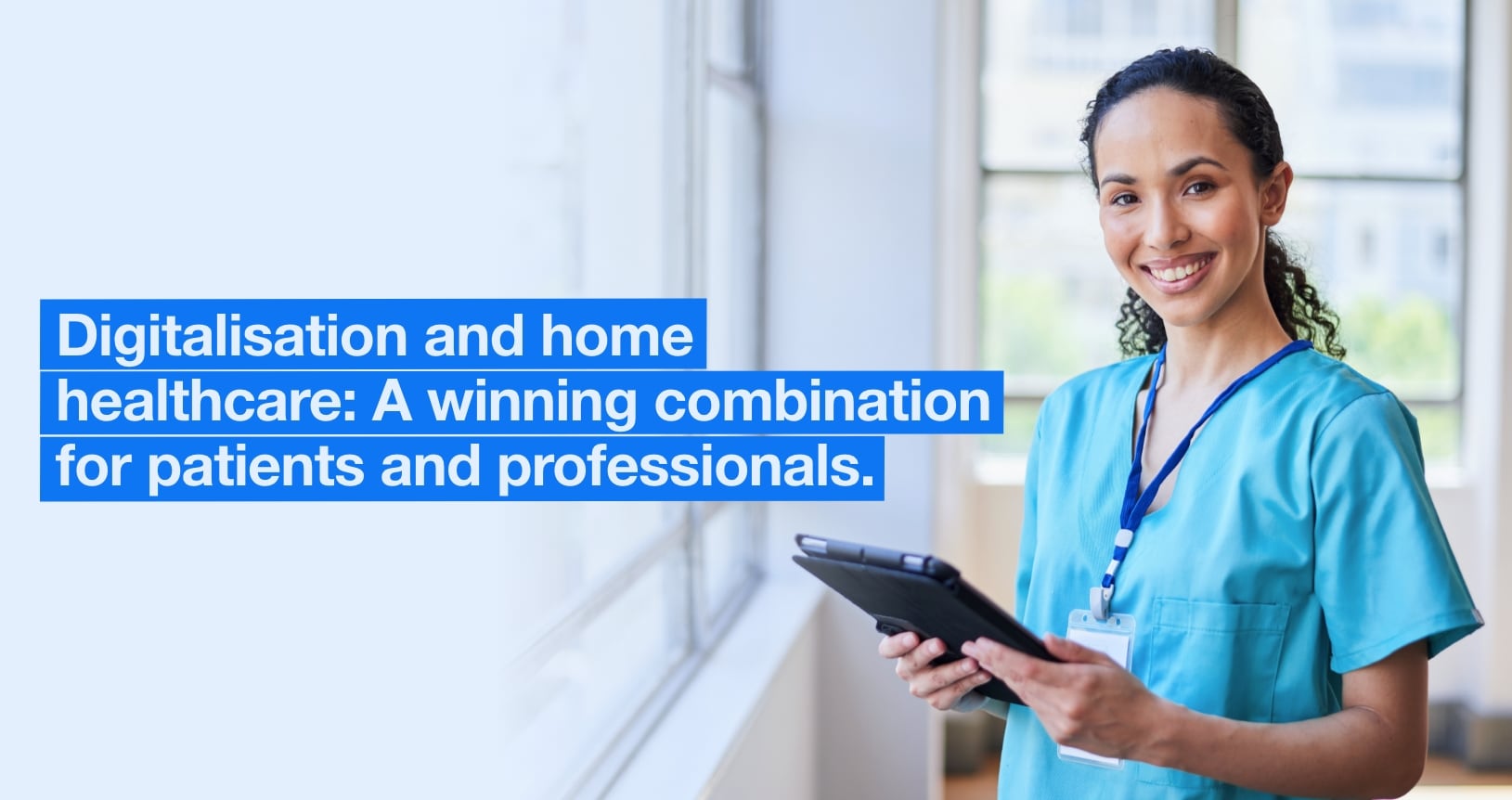Digitalisation and home healthcare: A winning combination for patients and professionals

Blog > Home healthcare > Digitalisation and home healthcare: A winning combination for patients and professionals
Digitalisation and home healthcare: A winning combination for patients and professionals
Published on 27 March 2025 • Reading time: 7 min read
Faced with an ageing population, an explosion in chronic illnesses and the need to unblock hospital overcrowding, home healthcare is emerging as a humane, personalised and effective solution. But the reality of this seemingly seamless care is far more complex for healthcare professionals, with routes to organise, heavy administrative workloads and difficult coordination.
Fortunately, digitalisation is changing the rules and offering practical solutions. Thanks to digital tools such as route optimisation software and electronic medical records, it is now possible to improve the responsiveness and accuracy of home healthcare, while tailoring it more closely to the specific needs of patients. Here’s how.
Table of contents:
- The main challenges of home healthcare
- How is digitalisation improving home healthcare?
- What digitisation means for patients
- Tangible benefits for healthcare professionals
- What you need to anticipate: limits and precautions
The main challenges of home healthcare
Limited access to resources
In hospital, healthcare professionals have everything they need at their disposal: equipment, staff and information. At home, however, this is not quite the case: they are often on their own, with no logistical support, and have to deal with a territory that is sometimes vast and poorly served. In some rural areas, the lack of healthcare professionals makes the task even harder.
Time constraints and the need for customisation
Route after route, mile after mile. There’s not enough time, even though patients are demanding finer, more extensive healthcare that’s better adapted to their pathologies. Carers are juggling tight deadlines, unforeseen circumstances and emotional pressures, sometimes to the detriment of human contact.
Monitoring and coordination problems
Good care depends on good monitoring. But without the right digital tools, information flows poorly between those involved. In fact, collaboration is still too often based on calls or paper notes. Between doctors, nurses, physiotherapists, care assistants… managing schedules without a shared tool becomes a real logistics headache. The result? Multiple calls, risks of forgetfulness, redundancy, wasted time… and ultimately, a poorer quality of care.
This is where digitalisation can make all the difference. But how?

Digitalisation is the answer to the challenges of home healthcare.
How is digitalisation improving home healthcare?
Route optimisation with AntsRoute for mobile carers
Platforms such as AntsRoute can be used to plan intelligent routes, taking into account the location of patients, preferred times, estimated treatment times, skills required, level of urgency, and so on. Journeys are optimised, travel reduced and the workload better distributed.
Thanks to the interface, teams can also track routes in real time, adjust schedules, notify patients automatically and trace operations.
☝️ “Patients are informed of our visit the day before and just before we arrive via an automated text message. The application also indicates the start and end [of each treatment], and therefore the duration of each visit. This means we can make sure we’re taking the right care and adjust it if necessary.” – Florian Savaris, Manager of the Mon Kiné network in Luxembourg.

The AntsRoute route optimisation software.
Electronic medical records and remote monitoring tools
Personal Health Records (PHRs) make it easier to share information securely between the various professionals involved in monitoring patients at home by centralising data: patient history, prescriptions, treatments, reports, etc. With just a few clicks, carers can consult or update information, as on the NHS App.
Combined with connected devices (blood pressure monitors, glucose meters, connected inhalers, etc.), these tools enable continuous medical monitoring. The data is automatically transmitted, and professionals are alerted in the event of any anomaly. In this way, remote monitoring encourages rapid and appropriate intervention, while reducing avoidable hospitalisation. It’s a real time-saver, providing greater security and peace of mind, particularly for fragile patients.
Teleconsultation and healthcare applications
Solutions such as Push Doctor, Babylon Health and Livi make it possible to organise remote consultations, monitor treatment or talk to a doctor in just a few clicks, whether using a smartphone or a computer. No more travel hassles! This reduces unnecessary journeys and ensures faster access to care, even in the most isolated areas.
Intelligent assistants and AI for patients
Personalised virtual assistants and chatbots are becoming real day-to-day companions for chronic patients. Treatment reminders, nutritional advice, activity monitoring, motivational messages, observation… these tools offer personalised support, 24 hours a day. They’re ideal for helping you get to grips with your illness!

How the digitalisation improves home healthcare.
What digitisation means for patients
Faster access to healthcare
Automated route planning and teleconsultation mean that waiting times can be considerably reduced. As a result, care is more responsive and better adapted to everyday constraints. It also means more patients can be seen in a day.
Closer monitoring
Thanks to connected objects and electronic medical records, professionals have a continuous, up-to-date view of patients’ state of health, enabling them to adapt their care decisions more quickly. This makes it easier to adjust treatments, detect warning signals quickly, reduce medical errors and improve the safety of care.
Personalised healthcare
Sharing data enables a patient-centred approach. Support is tailored to the patient’s lifestyle, needs and preferences. This personalised approach improves the day-to-day care experience. Digital technology means we can go beyond simple medical protocols to offer tailored support.
☝️ “When you have to deliver to elderly people, you can’t just drop a parcel off at their door. You need to take a ‘patient’ approach and spend time talking to each of them. AntsRoute allows us to manage this exchange time.” – Bertrand Mangin, head of the logistics delegation at GHEMM, French Hospital.
☝️ “The software allows us to specify a preferred care provider when the patient so requests. […] It allows us to support patient choice and ensure better continuity of healthcare.” – Florian Savaris, Manager of the Mon Kiné network in Luxembourg.

The benefits of digitising home healthcare.
Tangible benefits for healthcare professionals
Optimising working time
No more unnecessary detours or hours wasted on the road! With route optimisation software, journeys are planned logically, taking into account traffic, the geolocation of patients and the expected duration of care. Fewer kilometres, less stress, more time spent with patients. The result: better-organised days, a lighter mental workload and a more balanced daily routine.
☝️ “Using AntsRoute’s route optimisation software saves our team time when planning and offers a potential productivity gain of between 15 and 30%.” – Laurent Hamza, Team Manager at Help Air à Domicile.
☝️ “In addition to prioritising samples according to their nature, it is important to calibrate the procedures planned for each patient. The time taken to take a blood sample from a private individual is estimated at twelve minutes, and eight minutes in a retirement home […]. It is on the basis of this calculation that the solution puts forward an optimised itinerary for the routes.” – Nicolas Desjardins, CEO of Synlab Lorraine.
Reducing administrative tasks
Digitalisation is considerably simplifying the day-to-day lives of carers by automating tedious tasks such as writing reports, managing schedules and sending proof of attendance. These functions, integrated into mobile applications or business software, help to reduce the mental workload and refocus on the essentials: patient care.
Improving inter-professional communication
A shared file, accessible in real time by all those involved, ensures a smooth flow of information. Examination results, changes to treatment or specific recommendations are immediately visible, facilitating coordination, avoiding duplication and speeding up decision-making.

Digitalisation allows healthcare professionals to spend more time with patients.
What you need to anticipate: limits and precautions
Data protection
Health data security is an absolute priority. Digital tools must guarantee the confidentiality, integrity and traceability of information exchanged. To achieve this, they must comply rigorously with the RGPD, encrypt data, use secure connections and be hosted by HDS (Healthcare Data Hosting) service providers. Prevention is better than cure!
Training and support for professionals
To achieve a successful digital transformation, it is essential to get the teams on board. And that means much more than just technical deployment. Targeted training, adapted to everyday uses (mobile applications, connected objects, monitoring platforms), helps professionals to feel at ease with the tools. But it is just as important to make them aware of the need to protect health data, to ensure that it is used securely and responsibly.
Accessibility for all patients
Not everyone masters digital tools. People who are elderly, isolated or disabled need special support if they are not to be left behind. Simplified interfaces, human assistance, alternative solutions (telephone calls, paper versions): digital accessibility must be designed to ensure fair access to healthcare at home.
The digitalisation of home healthcare is not a gadget: it’s a structural change that will make it possible to improve efficiency, responsiveness, comfort and quality of care. But it must remain at the service of people.
Tomorrow, artificial intelligence, medical robotics and even the prediction of needs using health data will further enhance this dynamic. This combination of technology and home healthcare has already proved its worth. All that’s left is to embrace it with intelligence, ethics and kindness.
So don’t wait any longer to choose AntsRoute! Before you get started, you can test our solution for free for 7 days!
WRITTEN BY
Florine Martin
Florine has been a freelance web copywriter since 2021, writing for a variety of clients in a range of sectors. Since the beginning of 2024, she has been writing articles about logistics, FSM and home healthcare for our company, AntsRoute.
Free 7-day trial | No credit card required
Contenu
- The main challenges of home healthcare
- Limited access to resources
- Time constraints and the need for customisation
- Monitoring and coordination problems
- How is digitalisation improving home healthcare?
- Route optimisation with AntsRoute for mobile carers
- Electronic medical records and remote monitoring tools
- Teleconsultation and healthcare applications
- Intelligent assistants and AI for patients
- What digitisation means for patients
- Faster access to healthcare
- Closer monitoring
- Personalised healthcare
- Tangible benefits for healthcare professionals
- Optimising working time
- Reducing administrative tasks
- Improving inter-professional communication
- What you need to anticipate: limits and precautions
- Data protection
- Training and support for professionals
- Accessibility for all patients







